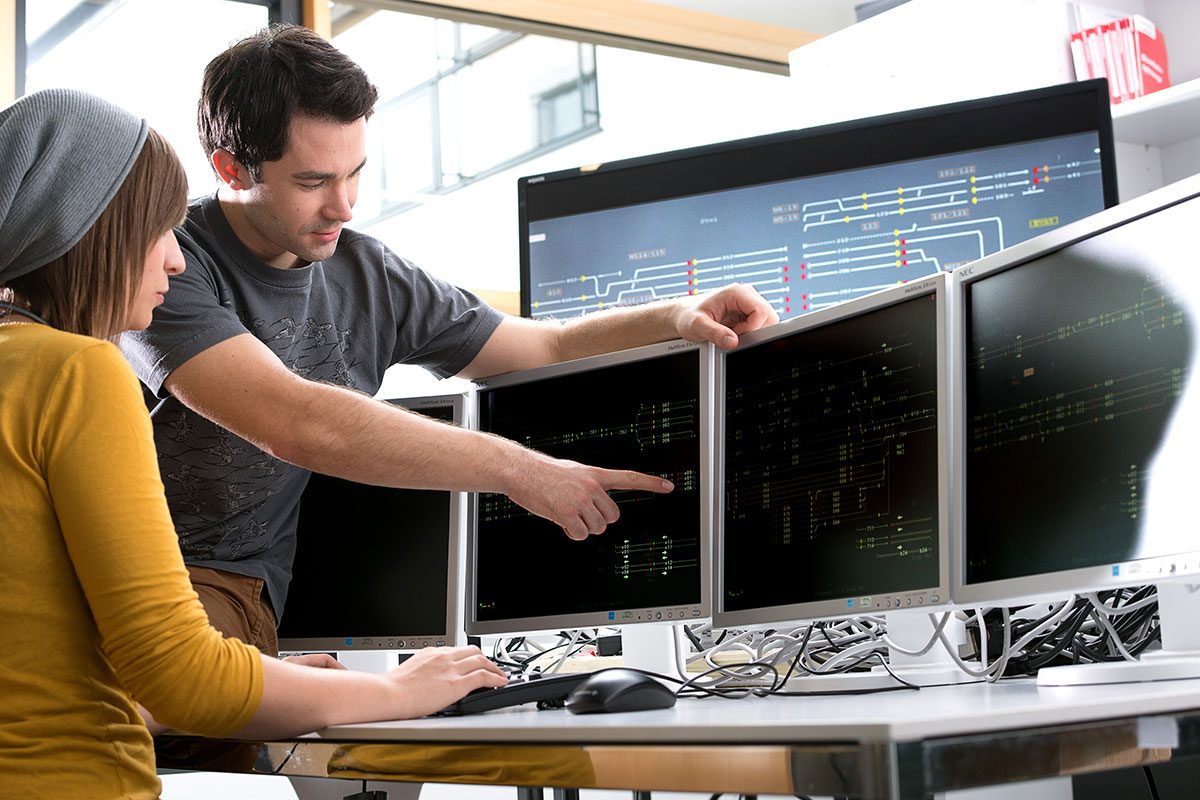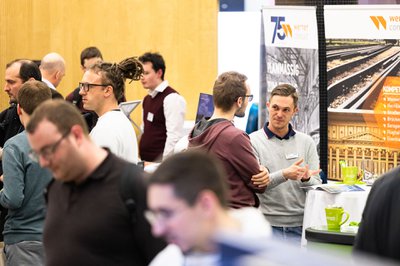Rail Technology and Mobility
Bachelor programme
More courses from the department
Rail Technology & MobilityRailways – transport for tomorrow’s world
The climate change and the necessary mobility change have increased the demand for environmentally friendly and efficient rail transport for persons and goods. This degree programme trains the urgently needed specialists and managers for the railway industry, railway companies, transport services and authorities. Our motivation is the creation of networked knowledge and the promotion of real talent. Hands on! Regular excursions, professional practical training, and exercises at the ÖBB's Wörth training centre play an essential role in the practical part of the programme. Students utilise their know-how in projects, working in interdisciplinary teams and applying various project management methods.

Information, Links and Downloads
Events
News

Bringing Careers on Track
Company Fair of the Railway Industry at the St. Pölten UAS
FAQ
What makes the Rail Technology study programme in St. Pölten unique?
Our study programme in Rail Technology is the only one of its kind in Austria and encompasses technical, operational, planning, and economic aspects of the railway system. It is the ideal programme for anyone wishing to establish a network and start a career in this industry.
The focus is on the acquisition of practical skills for professional life and on developing an understanding of the overall system as well as application expertise.
Particular highlights of the programme include
- the railLAB – a lab dedicated to rail transport,
- numerous field trips and projects,
- and the International Railway Operation Week where students get to know the real railway world by connecting with partner companies abroad.
The programme is also characterised by its strong cooperation partners. Lecturers from partner companies contribute top expertise and knowledge of current developments.
What are my career opportunities as a Rail Technology graduate?
Trains are the number one means of transport for the future. Climate change, Green Deal, and the necessary mobility transition increase the demand for the environmentally friendly and efficient transport of people and goods by train.
As universally trained railway engineers, our graduates are actively involved in shaping the rapid development of rail-bound transport systems.
Our graduates can take on leading positions in railway companies and as management personnel on different levels in the relevant industry, in planning agencies, and in the public sector.
What is the difference between studying part-time and full-time?
- In the part-time version of the study programme, there are two intensive weeks from Monday through Saturday per semester. Apart from these, classes are held on roughly ten weekends (Friday noon to Saturday evening) every semester. In this way, studying and can be well combined with a professional activity.
- In the full-time version, on the other hand, a few classes are held during the week.
Both versions – full-time and part-time – have the same number of units with compulsory attendance.
There are no differences in terms of teaching contents, either, except for the mandatory vocational internship that can be credited in case the student pursues a relevant activity in this industry.
Can I study Rail Technology without a “Matura/Abitur”?
Yes, it is possible to start this study programme without a Matura or Abitur (school-leaving examination at the end of secondary education).
To do this, prospective students can take a “Studienberechtigungsprüfung” (university qualification exam). Apart from this, they have the possibility to qualify for this programme through relevant professional qualifications (apprenticeship, vocational secondary school, German UAS qualification) plus additional exams.
When do the courses take place?
- In the part-time version, there are classes held on approximately ten weekends per semester. In addition, two intensive on-site weeks take place every semester.
- In the full-time version, a few classes are held during the week.
Both versions – full-time and part-time – have the same number of units with compulsory attendance.
The biweekly weekend classes start at 13:00 on Friday and end at 18:00 on Saturday, although there may be deviations from this rule depending on the respective course plan.
During the two intensive weeks per semester, there is teaching all day from approx. 9:40 on Monday to 18:00 on Saturday. Working students should plan (educational) leave times for this purpose.
Exams take place outside these times. The exam dates are agreed on in class between the lecturers and the students.